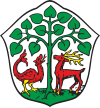Braniewo
| Braniewo | ||
|---|---|---|

Collegium Hosianum - defensive walls
|
||
|
||
| Coordinates: 54°23′N 19°50′E / 54.383°N 19.833°E | ||
| Country |
|
|
| Voivodeship | Warmian-Masurian | |
| County | Braniewo County | |
| Gmina | Braniewo (urban gmina) | |
| Established | 13th century | |
| Town rights | 1284 | |
| Government | ||
| • Mayor | Monika Trzcińska | |
| Area | ||
| • Total | 12.36 km2 (4.77 sq mi) | |
| Population (2006) | ||
| • Total | 17,875 | |
| • Density | 1,400/km2 (3,700/sq mi) | |
| Time zone | CET (UTC+1) | |
| • Summer (DST) | CEST (UTC+2) | |
| Postal code | 14-500 | |
| Area code(s) | +48 55 | |
| Car plates | NBR | |
| Climate | Dfb | |
| Website | http://www.braniewo.pl/ | |
Braniewo ([braˈɲevɔ]), (German: Braunsberg, Latin: Brunsberga, Old Prussian: Brus), is a town in northeastern Poland, in the Warmian-Masurian Voivodeship, with a population of 18,068 (2004). It is the capital of Braniewo County.
Braniewo lies on the Pasłęka River about 5 km from the Vistula Lagoon, about 35 km northeast of Elbląg and 55 km (34 mi) southwest of Kaliningrad . The Polish border with Russia's Kaliningrad Oblast lies 6 km north, and may be reached from Braniewo via National Highway (Droga Krajowa) 54.
According to the Gernan geographer Johann Friedrich Goldbeck (1748-1812), the town originally was named Brunsberg after Bruno von Schauenburg (1205–1281), bishop of Olmütz (Olomouc) in Moravia, who accompanied King Ottokar II of Bohemia in 1254 and 1267 when the latter participated in the crusade of the Teutonic Knights against the Old Prussians. It has also been suggested that the name Braunsberg might stem from Brusebergue ("camp of the Prussians"), but this notion is not documented.
In 1243 the settlement and the surrounding region of Warmia was given by the Teutonic Order to the newly created Diocese of Ermland (Bishopric of Warmia), whose bishop built his cathedral in the town and made it his chief residence. The city was granted town privileges based on those of Lübeck in 1254, but in 1261 was destroyed and depopulated during the second of the Prussian Uprisings. It was rebuilt in a new location in 1273 and settled by colonists from Lübeck. In 1284 it was given a new town charter, again based on that of Lübeck. However, the next bishop, Heinrich Fleming (1278–1300), transferred the chapter from Braunsberg to Frombork.
...
Wikipedia


